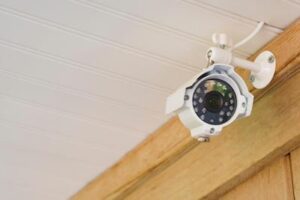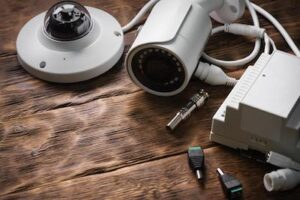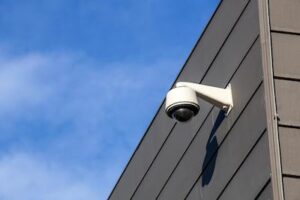The Optimal Internet Speed for Your Home’s IP Camera Surveillance System
If you’re considering installing an IP camera surveillance system in your home, one of the most important factors to consider is the speed of your internet connection. In order for your cameras to transmit high-quality video feeds in real time, you need to make sure that your internet connection is fast enough to support them. So, how can you determine the optimal internet speed for your home’s IP security camera system?
There are a few factors that will determine the optimal internet speed for your home’s security camera system. Some of these key factors include the number of cameras, the resolution, the frame rate, and your internet service provider.
In this blog post, we’ll explore how to determine the ideal internet speed for an IP camera and what factors you should consider before making a decision.

IP Cameras
Before we dive into the specifics of internet speed requirements for IP cameras, let’s take a quick look at what IP cameras are and how they work. IP cameras, or internet protocol cameras, are a type of digital video camera that transmits video data over an internet connection. Unlike traditional analog cameras, which require a physical connection to a recording device, IP cameras can be connected to the internet and accessed remotely from any location.
Benefits of IP Cameras for Your Home
IP security camera systems are an essential component of home security. They offer a wide range of benefits, such as deterring burglars, monitoring your property, and providing evidence in case of a break-in or other security incident.
One of the most significant advantages of IP security cameras is their ability to provide remote access to live and recorded footage. This means that you can access the cameras’ video feeds from anywhere, using your smartphone, tablet, or computer. This is particularly useful when you are away from home, as you can monitor your property and ensure everything is safe and secure.
Another advantage of IP security cameras is their high-resolution image quality. Unlike traditional analog cameras, which often provide grainy, low-quality footage, IP cameras offer crystal-clear video that makes it easier to identify individuals and objects. This is important when it comes to identifying potential intruders or suspicious activity around your home.
However, one of the most important benefits, though overlooked, is how these security cameras provide peace of mind to you and your family.
How to Determine the Optimal Internet Speed for Your Home’s IP Camera Surveillance System
Now, let’s move on to the topic at hand: how to determine the optimal internet speed for your IP camera surveillance system. There are several factors that can affect the internet speed requirements for your system, including the number of cameras you plan to install, the resolution of the cameras, and the frame rate at which they will be recording. Here’s a closer look at each of these factors and how they impact your internet speed requirements:
1. The Number of Cameras
The more cameras you have in your system, the more bandwidth you will need to support them. This is because each camera will be transmitting video data over your internet connection, which can quickly add up if you have multiple cameras. As a general rule of thumb, you should plan for about 1-2 Mbps (megabits per second) of bandwidth per camera. So, if you have four cameras in your system, you should plan for a minimum internet speed of 4-8 Mbps.
2. Resolution
The resolution of your cameras is another important factor to consider when determining your internet speed requirements. Higher-resolution cameras will require more bandwidth to transmit video data than lower-resolution cameras. For example, a 1080p camera will require more bandwidth than a 720p camera. As a general rule of thumb, you should plan for about 2-4 Mbps of bandwidth per camera for 1080p resolution and about 1-2 Mbps of bandwidth per camera for 720p resolution.
3. Frame Rate
The frame rate at which your cameras record video is another important factor to consider when determining your internet speed requirements. The higher the frame rate, the more bandwidth you will need to support it. As a general rule of thumb, you should plan for about 1 Mbps of bandwidth per camera for 30 frames per second (fps) recording and about 0.5 Mbps of bandwidth per camera for 15 fps recording.
Once you have a general idea of the internet speed requirements for your IP camera surveillance system, there are a few additional factors to consider before making a final decision.
Here are some additional tips to help you determine the optimal internet speed for your system:
– Internet Service Provider (ISP)
Your internet service provider plays a critical role in determining the speed of your internet connection. Make sure you choose an ISP that offers fast and reliable internet speeds. You can check your current internet speed by using a speed test tool like Ookla.
– Upload Speed vs. Download Speed
When choosing an internet plan for your IP camera system, make sure to pay attention to both upload and download speeds. Upload speed is particularly important for IP cameras, as it determines how quickly your cameras can transmit video data over your internet connection.
– Other Devices on Your Network
Keep in mind that other devices on your network, such as smartphones, tablets, and computers, will also be using your internet connection. Make sure to factor in the bandwidth requirements of these devices when determining your internet speed requirements for your IP camera surveillance system. You may need to upgrade your internet plan to accommodate the additional bandwidth requirements.

Considerations for Remote Access
If you plan to access your IP camera system remotely, you should also consider the speed and reliability of your internet connection at the remote location. Make sure you have a fast and reliable internet connection at the remote location to ensure smooth and uninterrupted video playback. Once you have considered all of these factors, you should have a good idea of the ideal internet speed for your IP camera surveillance system.
Other Factors to Consider
In addition to internet speed, there are a few other factors to consider when setting up your IP camera system for optimal performance. Here are some additional tips to help you get the most out of your system:
Choose High-Quality Cameras
The quality of your cameras will have a significant impact on the overall performance of your system. Make sure to choose high-quality cameras that are designed for surveillance applications. Look for cameras with features like night vision, motion detection, and weather resistance to ensure reliable and effective surveillance.
Use a Wired Connection
While some IP cameras can be connected wirelessly, we recommend using a wired connection for optimal performance. Wired connections offer faster and more reliable data transmission, which is particularly important for surveillance applications.
Consider Storage Requirements
Depending on the size of your surveillance system, you may need to consider storage requirements for your video data. Consider using a network-attached storage (NAS) device to store your video data, or consider cloud storage options if you need remote access to your video data.
Conclusion
In summary, in order to determine the optimal internet speed for your home’s IP security camera system, you must take into account all of the factors stated beforehand, which is important to do. As IP security camera systems are an essential component of home security, offering a wide range of benefits including remote access to live and recorded footage, high-resolution image quality, versatility, advanced motion detection technology, and peace of mind. Thanks for reading!

